President of Ghana
The president of the Republic of Ghana is the elected head of state and head of government of Ghana, as well as commander-in-chief of the Ghana Armed Forces. The current president of Ghana is Nana Akufo-Addo, who won the 2016 presidential election against the incumbent, John Dramani Mahama, by a margin of 9.45%. Nana Akufo-Addo was sworn into office on 7 January 2017.[2]
| President of the Republic of Ghana | |
|---|---|
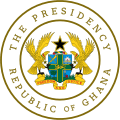 Presidential Seal of Ghana | |
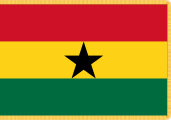 | |
| Style | His/Her Excellency |
| Residence | Jubilee House |
| Term length | Four years, renewable once |
| Inaugural holder | Kwame Nkrumah Republic established Jerry Rawlings Current Constitution |
| Formation | Republic Day 1 July 1960 1992 Constitution 15 May 1992 |
| Deputy | Vice-President of Ghana |
| Salary | 76,000 USD annually[1] |
| Website | (in English) Presidency.gov.gh (in English) Ghana.gov.gh |
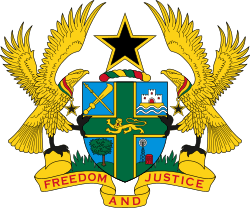 |
|---|
| This article is part of a series on the politics and government of Ghana |
| Constitution |
|
Executive |
|
Legislative |
|
|
|
|
Eligibility
According to Chapter 8, Article 62 of the 1992 Constitution of Ghana, a person shall not be qualified for election as the president of Ghana unless:
- (a) he/she is a citizen of Ghana by birth
- (b) he/she has attained the age of forty years; and
- (c) he/she is a person who is otherwise qualified to be elected a Member of Parliament, except that the disqualifications set out in paragraphs (c), (d), and (e) of clause (2) of article 94 of this Constitution shall not be removed, in respect of any such person, by a presidential pardon or by the lapse of time as provided for in clause (5) of that article.[3]
Oath of office
The president of Ghana must be sworn in by the chief justice before the citizens of Ghana at the Independence Square in Accra. The president-elect must repeat the following:
"I, _______________ having been elected to the high office of President of the Republic of Ghana do (in the name of the Almighty God swear) (solemnly affirm) that I will be faithful and true to the Republic of Ghana; that I will at all times preserve, protect and defend the Constitution of the Republic of Ghana; and that I dedicate myself to the service and well-being of the people of the Republic of Ghana and to do right to all manner of persons.
I further (solemnly swear) (solemnly affirm) that should I at any time break this oath of office; I shall submit myself to the laws of the Republic of Ghana and suffer the penalty for it. (So help me God)".[4]
Insignia
After the oath of office has been taken by the elected president, these following insignia are handed over to the president. These devices are used to display the rank of his/her office and are used on special occasions.
- President's Sword (image) and the Presidential Seat. A carved wooden seat overlaid with gold.
Powers and duties of the president
| Presidential styles of Nana Akufo-Addo | |
|---|---|
 | |
| Reference style | 'His Excellency President of the Republic of Ghana" |
| Spoken style | Your Excellency" |
| Alternative style | Mr. President |
Chapter 8 of the Constitution of Ghana states the duties and the powers of the president. The president is required to:
- uphold the Constitution
- exercise executive authority
- preserve the safety and homeland of Ghana.[3]
Also, the president is given the powers:
- as the leader of the executive branch of government
- as the commander-in-chief of the military
- to declare war
- to hold referenda regarding issues of national importance
- to issue executive orders
- to issue medals in honor of service for the nation
- to issue pardons
- to declare a state of emergency suspending all laws or enacting a state of martial law.[3]
The president may execute or cause to be executed treaties, agreements or conventions in the name of the Republic of Ghana.[3] The president shall take precedence over the populace of the Republic of Ghana and may refer important policy matters to a national referendum, declare war, conclude peace and other treaties, appoint senior public officials, and grant amnesty (with the concurrence of the Parliament of Ghana).[3] In times of serious internal or external turmoil or threat, or economic or financial crises, the president may assume emergency powers "for the maintenance of national security or public peace and order".[3]
The president shall be removed from office if he/she is found, in accordance with the provisions of the Constitution, Chapter 8 section 69 (ii) – prejudicial or inimical to the economy or the security of the Republic of Ghana.[3] The president shall cease to hold office on the date the Parliament of Ghana decides that he/she be removed from office.[3]
List of presidents of Ghana (1960–present)
Convention People's Party People's National Party National Democratic Congress New Patriotic Party Military
| No. | Portrait | Name (Birth–Death) |
Election | Term of office | Political Party | ||
|---|---|---|---|---|---|---|---|
| Took office | Left office | Time in office | |||||
| Presidents of the Republic of Ghana (First Republic: 1960–1966) | |||||||
| 1 | .jpg) |
Kwame Nkrumah (1909–1972) |
1960 | 1 July 1960 | 24 February 1966 (Deposed in a coup d'état) |
5 years,
236 days |
Convention People's Party |
| Presidents as Head of State (Second Republic: 1966–1972) | |||||||
| 1 | Joseph Ankrah (1915–1992) Chairman of the NLC |
— | 24 February 1966 | 2 April 1969 | 3 years,
39 days |
National Liberation Council | |
| 2 | Akwasi Afrifa (1936–1979) Chairman of the NLC until 3 September 1969, thereafter Chairman of the Presidential Commission |
— | 2 April 1969 | 7 August 1970 | 1 year,
126 days |
National Liberation Council | |
| 3 | Nii Amaa Ollennu (1906–1986) |
— | 7 August 1970 | 31 August 1970 | 24 days | Independent | |
| 4 | 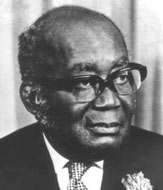 |
Edward Akufo-Addo (1906–1979) |
— | 31 August 1970 | 13 January 1972 (Deposed in a coup d'état) |
1 year,
134 days |
Independent |
| 5 | Ignatius Acheampong (1931–1979) Chairman of the NRC until 9 October 1975, thereafter Chairman of the SMC |
— | 13 January 1972 | 5 July 1978 (Deposed in a palace coup d'état) |
6 years,
174 days |
Supreme Military Council | |
| 6 | Fred Akuffo (1937–1979) Chairman of the SMC |
— | 5 July 1978 | 4 June 1979 (Deposed in a coup d'état) |
334 days | Supreme Military Council | |
| Presidents as Head of State (Third Republic: 1979–1981) | |||||||
| 1 | _(cropped).jpg) |
Jerry Rawlings (1947–) Chairman of the AFRC |
— | 4 June 1979 | 24 September 1979 | 112 days | Armed Forces Revolutionary Council |
| 2 |  |
Hilla Limann (1934–1998) |
1979 | 24 September 1979 | 31 December 1981 (Deposed in a coup d'état) |
2 years,
98 days |
People's National Party |
| 3 | _(cropped).jpg) |
Jerry Rawlings (1947–) Chairman of the PNDC |
— | 31 December 1981 | 7 January 1993 | 11 years, 7 days | Provisional National Defence Council |
| Presidents of the Republic of Ghana (Fourth Republic: since 1993) | |||||||
| 1 | _(cropped).jpg) |
Jerry Rawlings (1947–) |
1992 1996 |
7 January 1993 | 7 January 2001 | 8 years | National Democratic Congress |
| 2 | John Kufuor (1938–) |
2000
2004 |
7 January 2001 | 7 January 2009[5] | 8 years | New Patriotic Party | |
| 3 | .jpg) |
John Atta Mills (1944–2012) |
2008 | 7 January 2009[5] | 24 July 2012[6] (Died in office) |
3 years,
199 days |
National Democratic Congress |
| 4 | .jpg) |
John Mahama (1958–) |
2012 | 24 July 2012[7] | 7 January 2017[8] | 4 years,
166 days |
National Democratic Congress |
| 5 | 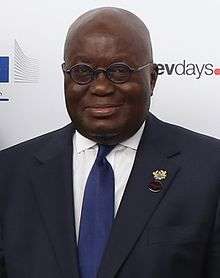 |
Nana Akufo-Addo (1944–) |
2016 | 7 January 2017 | Incumbent | 3 years, 172 days | New Patriotic Party |
Residence
| Jubilee House | |
|---|---|
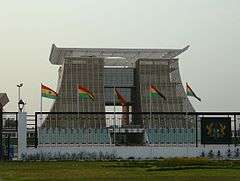 Golden Jubilee House and Presidential Palace | |
| General information | |
| Location | Accra, Ghana |
| Current tenants | Nana Akufo-Addo |
The president of Ghana's official residence was Osu Castle (also known as Fort Christiansborg or Christiansborg Castle) in Accra. In 2007, the opposition MPs in Ghana stormed out of a parliamentary debate on whether to take out a $50m loan to build a new presidential palace. MPs from President John Kufuor's New Patriotic Party voted unanimously in favour of taking the loan from India.[9]
They argued that the president should not be based in Osu Castle, where slaves used to be kept. The opposition National Democratic Congress said the money would be better spent elsewhere.[9] The old flagstaff house used by Ghana's first president as a residence is being renovated into a museum, while the grounds on which it stands is being built up as an ultra modern office complex and residence for the president and vice-president of Ghana as well as their staff.[9] The new presidential palace was expected to be completed by August 2008 but was finally completed in November 2008. At the inauguration of the new presidential palace, President John Kufuor revealed to the press that the new name of the palace would be Golden Jubilee House. The name was chosen in reference to the 50th anniversary of Ghana's Independence.[9]
Part of the office space has been given to the Ministry of Foreign Affairs when it had to be relocated because of a fire that gutted its offices. The NDC government refused to move to the venue after it assumed office in 2009 noting that some of the work in the residency is not completed. The government of President Atta Mills also noted that the National Security establishment Bureau of National Investigations (BNI) wanted to ensure that security at the venue was improved before the government moved in. The name was changed to Flagstaff House by John Atta-Mills in an attempt many see as to cover its link to the celebration of the 50th anniversary of Ghana under the New Patriotic Party. On 7 February 2013, the office of the presidency was finally moved to the Flagstaff House.[10]
The name has been reverted to the Jubilee House.
Transport
.jpg)
National transport services for the Ghanaian President are:[11]
- Limousines
- Rolls-Royce Phantom Coupé (including Ghosts)
- Mercedes-Benz S-Class
- Maybach
- Escort cars
- Honorary escort (motorcycles)
Air transport services for the Ghanaian President are:[12]
- Airplanes for long-distance travel
- Dassault Falcon 900 (long-range) – main jet aircraft
- Embraer Jet 190 (long-range)
- Helicopters
The presidential aircraft uses the colour scheme as the flag of Ghana in stripes, except for the use of the Ghanaian coat of arms on the empennage instead of the flag of Ghana.
In the autumn of 2012 a jet aircraft was acquired in the Golden Jubilee House. According to the Chief of the Golden Jubilee House Property Agency acquisition of a Embraer 190 jet aircraft for the president costed 105 million cedis (about $55 mln). The jet aircraft planned location is in the Ghanaian Presidential Retreat's Peduase Lodge.[13]
Timeline since 1960

Latest election
| Candidate | Party | Votes | % | ||
|---|---|---|---|---|---|
| John Dramani Mahama | National Democratic Congress | 5,574,761 | 50.70 | ||
| Nana Akufo-Addo | New Patriotic Party | 5,248,898 | 47.74 | ||
| Paa Kwesi Nduom | Progressive People's Party | 64,362 | 0.59 | ||
| Henry Herbert Lartey | Great Consolidated Popular Party | 38,223 | 0.35 | ||
| Ayariga Hassan | People's National Convention | 24,617 | 0.22 | ||
| Michael Abu Sakara Foster | Convention People's Party | 20,323 | 0.18 | ||
| Jacob Osei Yeboah | Independent | 15,201 | 0.14 | ||
| Akwasi Addai Odike | United Front Party | 8,877 | 0.08 | ||
| Invalid/blank votes | 251,720 | – | |||
| Total | 11,246,982 | 100 | |||
| Registered voters/turnout | 14,158,890 | 79.43 | |||
| Source: Electoral Commission of Ghana | |||||
President-elect
The president-elect of Ghana is the apparent winner, as ascertained by the chairperson of the Electoral Commission of Ghana, following the general election on 7 December.
During the period between the presidential election and the inauguration, the outgoing president is a lame duck, while the incoming president heads a presidential transition team to ensure a smooth handover of power. If a sitting president has won re-election, the incumbent is not referred to as a president-elect as he or she is already in office and is not waiting to become president. Likewise, if a vice president succeeds to the presidency by way of the president's death, resignation or removal (via impeachment) from office, that person never holds the title of President-elect, as they would become the president immediately. The most recent president-elect is former Minister of Foreign Affairs Nana Akufo-Addo of the New Patriotic Party, who won the presidential election on 9 December 2016.[14]
The vice president–elect of Ghana is the running mate of presidential candidate who wins an election. First established after the adoption of the 3rd Constitution of Ghana, the inaugural holder is Joseph W.S. deGraft-Johnson. The current vice president–elect of Ghana is Mahamudu Bawumia. Until the formation of the 3rd Republic of Ghana, the position of Vice President did not exist.
List of presidents-elect
| President–elect | Party | From | To | Number of days | ||
|---|---|---|---|---|---|---|
| 1 | Kwame Nkrumah | CPP | 20 April 1960 | 1 July 1960 | 72 days | |
| 2 | Hilla Limann | PNP | 9 July 1979 | 24 September 1979 | 78 days | |
| 3 | Jerry John Rawlings | NDC | 3 November 1992 | 7 January 1993 | 65 days | |
| 4 | John Agyekum Kufuor | NPP | 28 December 2000 | 7 January 2001 | 10 days | |
| 5 | John Atta Mills | NDC | 28 December 2008 | 7 January 2009 | 10 days | |
| 6 | John Dramani Mahama | NDC | 28 December 2012 | 7 January 2013 | 10 days | |
| 7 | Nana Akufo-Addo | NPP | 9 December 2016 | 7 January 2017 | 31 days | |
Prime Minister Kwame Nkrumah became the first Ghanaian to be elected as President of the Republic of Ghana. President Limann holds the record of having the longest transition period from President-elect to President. His transition period lasted 78 days. President Rawlings prior to the presidential elections in 1992, was already head of state of Ghana. He was the chairman of the Provisional National Defence Council. Because Ghana adopted a new constitution in 1992, the position of President of the Republic was vacant. President John Kufuor and President John Atta Mills both hold the record of having the shortest transition period from President-elect to President with both transition period lasting only 10 days. This is both presidents needed a second round of voting (2000, 2008) to win the presidential election.
References
- "Top 15 Highest Paid African Presidents 2017". 15 December 2016.
- "Ghana Election: President admits defeat in poll". BBC. BBC News. 9 December 2016. Retrieved 9 December 2016.
- The President – Chapter 008 – The Constitution of the Republic of Ghana 1992 – The Executive Archived 28 July 2013 at the Wayback Machine. judicial.gov.gh. Judiciary of Ghana.
- The Constitution of the Republic of Ghana 1992 – The Oath of Allegiance Archived 20 July 2011 at the Wayback Machine. judicial.gov.gh. Judiciary of Ghana.
- "Profile: Ghana President John Atta Mills". BBC World News. 3 January 2009.
- "Ghana's President John Atta Mills dies". BBC World News. 24 July 2012.
- Nossiter, Adam (24 July 2012). "Atta Mills dies". New York Times. Retrieved 11 April 2013.
- "Ghanaian President John Dramani Mahama sworn in". Sina Corp. 7 January 2013.
- "Ghana unveils presidential palace". BBC News Online. 10 November 2008. Retrieved 7 June 2013.
- President Mahama Moves To The Flagstaff House Archived 8 May 2013 at the Stanford Web Archive. presidency.gov.gh.
- President's transports. Cars. Government allocates Kufuor two Mercedes Benz cars, two four-wheel to follow
- President's transports. Air transport. Veep Inaugurating Falcon 900 EX EASY Presidential Jet
- "Ghana gets a New Presidential Jet". adeparadio.com. Archived from the original on 24 June 2013. Retrieved 7 June 2013.
- GhanaWeb (9 December 2016). "EC declares Akufo-Addo president-elect". ghanaweb.com. Accra: Apex AdMedia. Retrieved 25 May 2018.